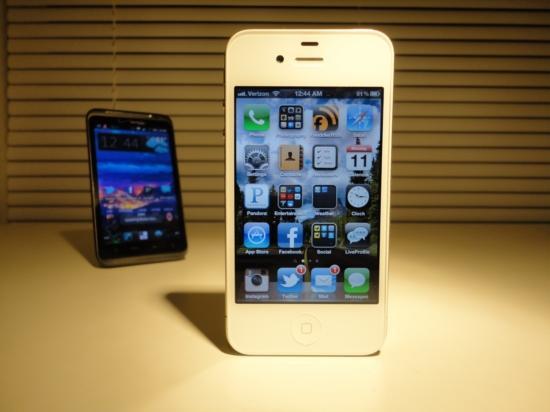
This is a battle for the history books, folks. The back-and-forth between Android and iOS is never-ending. "The iPhone has more apps and it's pretty." "So? My droid has the 4Gs and a kickstand!" The truth is, none of this really matters in the long run. Both platforms have a huge following, which will ultimately cement their stay in the mobile market for at least the next few years.
A recent report from Nielsen unveiled that 56 percent (out of 25,500 surveyed) of new smartphone subscribers chose to go with Google's Android. Coming in at second, 28 percent chose an iPhone. That means that in the US, for every two Android phones sold to new smartphone users, one iPhone was sold. When you consider that Android is available in dozens of flavors and on every wireless provider across the nation, in comparison to the iPhone currently being exclusive to AT&T and Verizon, the iPhone is actually doing quite well for itself.
Seeing as the iPhone by itself is a cash cow, other carriers have been in talks to bring Apple's iconic device to their shelves. Rumor has it that Sprint will be getting the iPhone 5 (maybe 4S) once it releases. But the CMO of T-Mobile, Cole Brodman, has made it very clear that Magenta will not be getting the iPhone this year.
Why not? Well, it's not exactly clear. It could be the AT&T-Mobile merger, it could also be that T-Mobile and Apple can't come to level terms. Whatever the real reason, we know that T-Mobile wants the iPhone. (Why wouldn't they?) Coming from BGR, in Brodman's most recent statements, he claims "there are over a million T-Mobile customers using unlocked iPhones" on their network and they are interested in offering "a no-compromise iPhone experience" to all of their customers. He goes on to say, "Please know that we think the iPhone is a great device and Apple knows that we'd like to add it to our line-up.
Then he changes the pace a bit by adding, "We are very confident that these Android smartphones rival or beat any smartphone out there in terms of functionality, speed, overall experience and features -- including the iPhone."
Aside from contradicting himself and sort of playing the devil's advocate, Brodman makes some pretty bold claims. Sure, Android does beat the competition in functionality, speed (network, not always performance) and features. But overall experience? Performance? Consistency? Not even close. At least not 100 percent – maybe not even 20 or 30 percent – of the time.
Don't get me wrong, I love Android. It's flawed, as is every other platform out there, but I love it. That said, Android is some of the buggiest, most inconsistent software I've ever used (and I've used a lot of different software). Even when Android is skinned and spruced up by a third-party, it's still as buggy and inconsistent as ever. It's getting better with time, but Android largely still feels like beta software to many. Not to mention, low-end handsets can easily give users the wrong impression.
Apple, on the other hand, has a way of offering the utmost consistency to their customers, from their Mac lines to the iPad and iPhone. Contrary to popular belief, their products are not perfect. But at least you know what to expect out of an Apple product every time you turn it on. It doesn't act differently every time you hit the power button (unless you're running a iOS 5 Beta 7, of course).
This is why people are so loyal to Apple. This is why Apple's mobile endeavors have a return customer rate of roughly 89 percent versus Android's 55 percent. Call me crazy, but moving forward from Mango, with the addition of high-end hardware (and the likes of Nokia), I'm sure Microsoft will yield a relatively high "sticky customer" rate, too.
Not everything Brodman said was out of line. It's great to know that T-Mobile is actually trying to get their hands on the iPhone. But next time, Brodman, if you're going to say things that can be interpreted as a "public plea," make sure you are not also trying to play down the fact that you still don't have the iPhone yet.